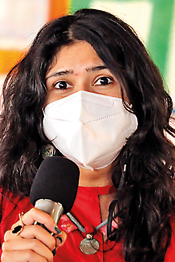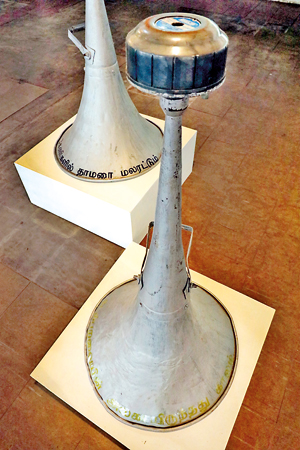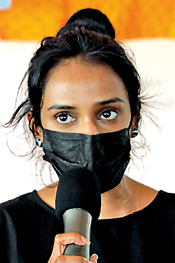Spaces,venues alive with ‘Language is Migrant’

At the Public library: A woodcut print produced and sent by Pangrok Sulap, a collective of artists, musicians and activists in Sabah, Malaysia based on their exchanges with Lankan music group The Soul
In the auditorium of the Public Library, installations for Colomboscope have been set.
Packiyanathan Ahilan’s ‘Muted Speakers’ (2021) feature upside down loudspeakers on cool grey blocks, which have the effect of making the speakers look like silent, steel traffic cones. “SEETHA I LOVE YOU FROM YOUR LOVING SARA” reads the black-brown scrawl on an aged cassette cover which would usually contain the track list. The cassette cover and its cassette (an aged romance artefact? Where are Seetha and Sara now? What are the songs on this mixed tape? I have questions) are a part of an interactive installation by We Are From Here, an art collective preserving and collecting community memory from Slave Island.
The installation features some of the original souvenirs and ephemera collected from the communities in Slave Island over the past two years. It also lets viewers browse through more memorabilia which provide snapshots of community histories: a letterhead of a papare band business, a scan of a curfew pass on August 12, 1953, an April 1954 seating card for a review of the armed forces to mark the visit of Queen Elizabeth II and the Duke of Edinburgh offer vignettes of buried personal and community history from people from parts of Colombo which have edged out to make room for a new iteration of the city.

Natasha Ginwala
For the team behind Colomboscope, the venues and spaces also play into the theme ‘Language is Migrant’ and the works featured in the festival.
“It’s definitely about what it means for a festival to step outside the domains of the enclosed art world and white cube – which is something we’ve done constantly in our six previous editions as well,” says Natasha Ginwala, artistic director – Colomboscope, reflecting on the interplay between the venues, artistic work and featured artists.
Over the next seven days, six venues in Colombo come alive with artworks, performances, workshops and installations from artists exhibiting at Colomboscope 2022. The festival’s seventh edition takes place at the Colombo Public Library, Rio Complex, Barefoot Gallery, W.A. Silva Museum, Lak Café – Viharamahadevi Park and Lakmahal Community Library. It brings together over 50 Sri Lankan and international artists, with a special focus on South Asian dialogue.
For instance, the Public Library – a space where text, individual authors and official history take precedence – opens up opportunities for an independent arts festival and diverse artists to contend with the histories of violence that are erased from mainstream history-telling and knowledge building, explains Ginwala on a media tour, a few hours before the opening of the festival on Thursday.

Muted Speakers: Packiyanathan Ahilan’s installation. Pix by M.A. Pushpa Kumara
Apart from the auditorium, the Public Library’s garden, newspaper room and Korea Corner will temporarily play home to some of the installations, workshops and performances that make up this year’s Colomboscope.
“When integrating artworks into the everyday life of the library, we were very conscious to bring in oral histories, communal projects, speculative knowledge and performative methods and visual manifestation of written poetry rather than bring more ‘text’, in that sense, into the library,” says festival curator, Anushka Rajendran.

Anushka Rajendran
Since its inaugural edition in 2013, Colomboscope has sought to explore varied public spaces in Colombo to celebrate the arts, hopscotching across multiple venues in the city. Over the years, it has also transformed itself while establishing numerous initiatives, tandem residencies and collaborations beyond the boundaries of a physical arts festival.
At the Barefoot Gallery, personal histories come to the fore through multiple visual chronicles. Areez Katki intersperses text and textiles, reflecting on multiple identities (as Parsi-born former priest, a queer migrant body) embroidering on dust cloths and voile handkerchiefs left to him. T. Vinoja’s introduction to fabric and sewing was through her mother who works as a seamstress. Her work at Colomboscope combines inner landscapes and aerial views of terrains to examine themes of loss, abandonment, memory and pain – the stitching is often jagged and discontinuous, patches and burns feature on cloth, one installation is made out of bandages.
Colomboscope 2022 is open to the public till January 30. All events are free.
Events are at limited capacity. For the full list of events, registration and more info, please visit: https://www.colomboscope.lk/programmes.
| Event spotlight | |
| Date and time : Monday, January 24, 1pm – 3pm Location : Lakmahal Community Library Event :
The Strange Library
The curators present a walk-through of the exhibition chapters at two locations.
A zine-making workshop by The Packet, an artist collective. Participants will get a change to make their own handmade zines and engage with the artists from The Packet. Advance registration required.
Young adults will be led through an interactive workshop involving the making of real and make-believe creatures composed from beads and a reflection on the history of beads.
Led by Fabienne Francotte, the workshop explores drawing as a method to articulate collective experiences and emotions.
The Hearing Voices Café, a project by Dora Garcia, held in different parts of the world, will be realized in Sri Lanka for the first time. The project is in collaboration with Jayampathi Guruge and several guest artists and writers. |
Searching for an ideal partner? Find your soul mate on Hitad.lk, Sri Lanka's favourite marriage proposals page. With Hitad.lk matrimonial advertisements you have access to thousands of ads from potential suitors who are looking for someone just like you.


